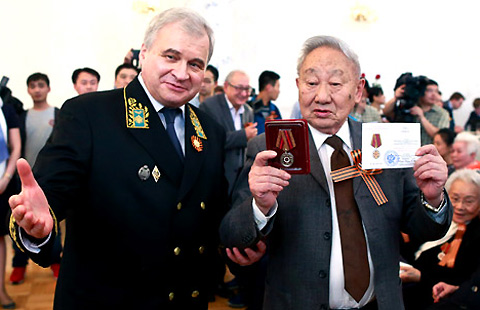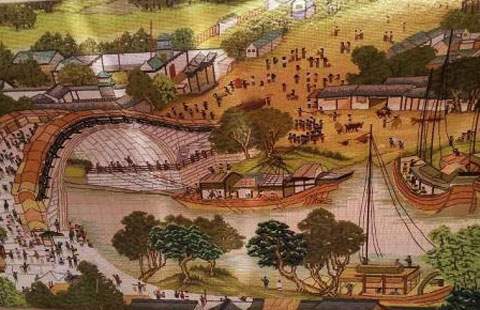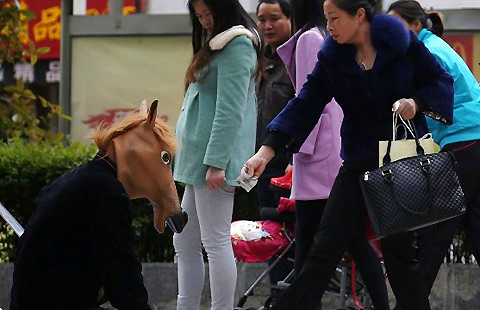Businessman highlights need for streamlining
Updated: 2015-04-17 07:16
By Li Wenfang(China Daily)
|
||||||||
His work on reducing government approval procedures won backing from Premier Li Keqiang
Cao Zhiwei, a real estate company chairman and member of the political advisory body of Guangzhou, admits to gaining a far greater sense of achievement from the latter role.

Cao only became a member of the advisory body toward the end of 2010, but he stole the limelight at the annual session of the Guangzhou committee of the Chinese People's Political Consultative Conference in January 2013 by displaying a 4.4-meter-long graphic that detailed all the government approvals necessary for an investment project.
He dubbed the chart the "10,000-Mile Long March Approval Map". It featured 100 approval procedures, 108 seals, and 36 administrative charges involving 20 commissions, offices and bureaus and 53 divisions, centers and stations. It also showed it took on average 2,020 days to go through the procedures. The shortest route took 799 days to complete.
Cao used the graphic to highlight the need for reform in government approval procedures. It received nationwide attention. It also preceded a trial program to optimize approvals for construction projects issued by the Guangzhou city government, which reduced government approval procedures to five and the processing time to 37 working days.
The diagram was presented to Premier Li Keqiang during his visit in January to the Nansha district of Guangzhou, which will form part of the free trade zone in Guangdong province.
"The redundant approval procedures should all be crossed off and made history," Li said, adding that lengthy approval procedures hold back market vitality and breed corruption. He encouraged the Guangdong government to continue to blaze a trail in related reforms.
Cao made a splash again during the annual session last year when he presented another graphic - a 3.8-meter-long chart featuring the 103 certificates and permits a person may have to obtain during their lifetime, including those on identity, education, property and marriage. He excluded the obscure ones such as the permits for harvesting corn and burning straw.
He proposed that government agencies pull down the administrative barriers, coordinate information and establish a nationwide data network of citizen's information to provide a modern and better managed service.
Copies of Cao's two diagrams were donated to the Chinese Academy of Governance last year.
The spotlight fell on Cao again this year with the establishment of his political advisory workshop, the first of its kind in the country.
The workshop performs all of the research for his proposals and has four full-time workers, including Cao, as well as volunteers. It is also hiring more members.
Cao, 47, is financing the workshop and has been spending more than 80 percent of his working time on it. He attributes his enthusiasm for this work to a sense of mission, citing the influence of his parents, who were both public servants.
"When I see reforms bearing fruit, I feel like a young man. I see the value of my life. I don't feel it anymore in making money," he said.
The performance of Cao Zhiwei as a political adviser can be seen as a star member pushing forward administrative approval reform with influence as a member and personal resources, said Zhang Jingen, a professor with the center for anti-corruption studies at Sun Yat-sen University in Guangzhou.
"The star members possess rich personal resources and initiative, which make it easier for them to do concrete things. They are able to cast influence on the government with personal influence and the media. If the local government is willing to listen to what the members propose, it is positive for reforms," Zhang said.
Cao also serves as an adviser for administrative reform in Hainan province and has given lectures to government agencies across the country, all at his own expense. He has written letters to former premiers and Premier Li, expressing his views on economic development.
The biggest critic of his work is Cao himself.
"A proposal should raise the issue, provide the solution and include ways to evaluate its impact," he said.
Zhai Jiajia and Wang Zijia contributed to this story.
liwenfang@chinadaily.com.cn

 Top 10 industries with most job-hoppers
Top 10 industries with most job-hoppers
 Russia honors Chinese veterans from WWII
Russia honors Chinese veterans from WWII
 Woman embroiders giant painting
Woman embroiders giant painting
 HK singer-actress Mok takes fans on global journey
HK singer-actress Mok takes fans on global journey
 Sandstorm engulfs North China
Sandstorm engulfs North China
 Qinghai quake: Reliving the memory
Qinghai quake: Reliving the memory
 Father horses around to save his son
Father horses around to save his son
 Ten photos you don't wanna miss - April 15
Ten photos you don't wanna miss - April 15
Most Viewed
Editor's Picks

|

|

|

|

|

|
Today's Top News
US-listed Chinese tech stocks not bubbly: analysts
AIIB praised, US criticized by experts
Japan tops China as top holder of US debt
Q1 economic data: what the economists say
AIIB to operate in 'transparent way'
China-Canada Year kicks off
Paulson: US should have joined AIIB
Economic reforms in China are 'needed'
US Weekly

|

|







